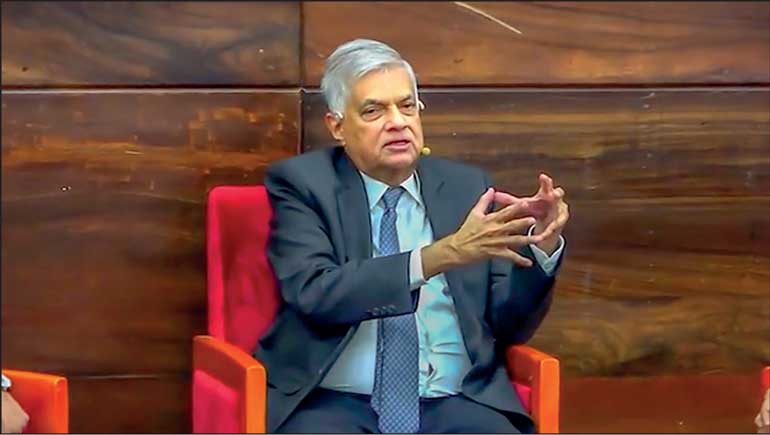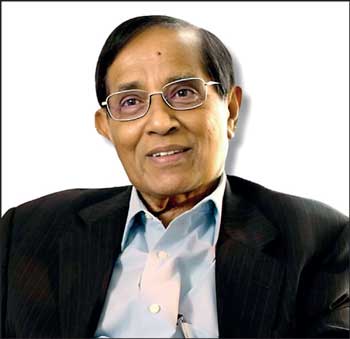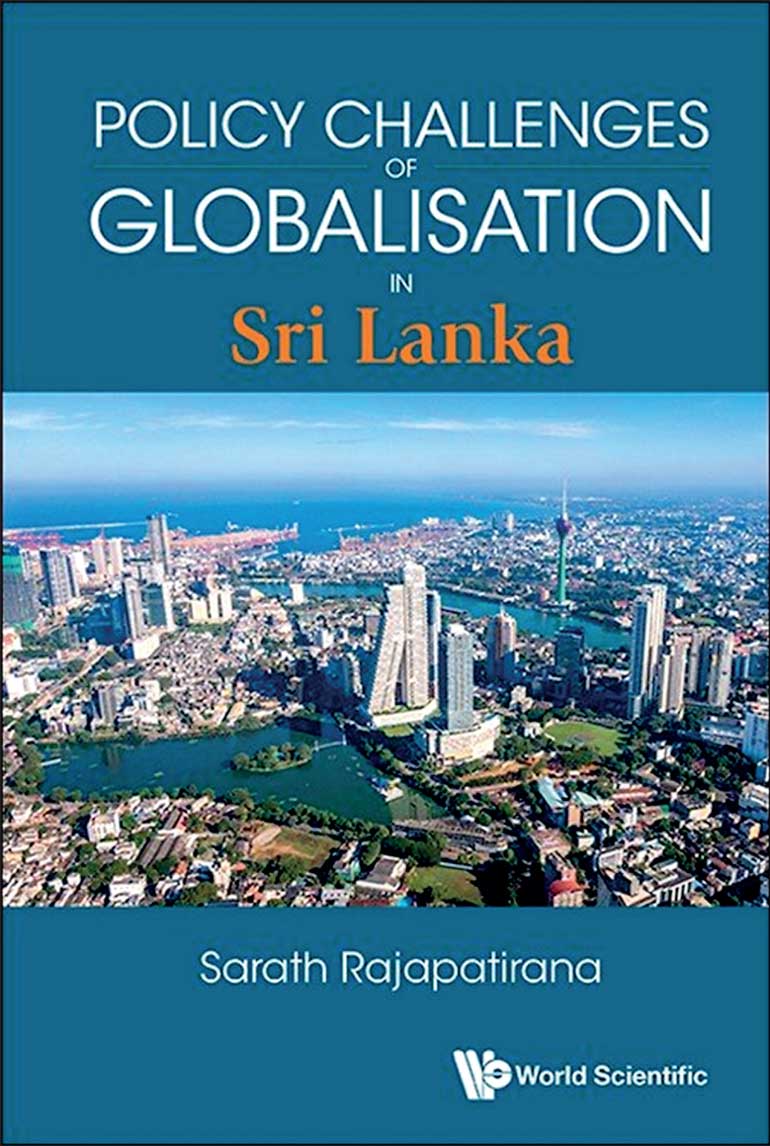Wednesday Feb 18, 2026
Wednesday Feb 18, 2026
Monday, 28 July 2025 01:40 - - {{hitsCtrl.values.hits}}
 Ex-President Ranil Wickremesinghe at the book launch
Ex-President Ranil Wickremesinghe at the book launch
 Sri Lanka: An open economy in ancient times
Sri Lanka: An open economy in ancient times
Sri Lanka had been a beneficiary of the waves of globalisation that had struck it for thousands of years. It had been open to trade, investment, transfer of knowledge, and factor mobility without hindrance. The country’s chronicle, Mahavamsa, talks about an incident that had happened in the 6th century BCE showing that the country had been visited by foreign ships laden with rice and other goods. According to the story, when Prince Vijaya landed in Thambapanni, the local princess Kuveni had hosted him and his retinue numbering 600 to a meal of rice and an assortment of gifts. According to Mahavamsa, rice for the meal and items for gifts had been procured from merchant ships that had been wreaked in the nearby seas.1
Since the ancient kings had actively supported this wave of globalisation, there had not been any policy challenges for those who oversaw it. In fact, the kings had provided all the logistics to facilitate free trade and investment. During the time of the King Parakramabahu, I, when the country was subject to the highest degree of globalisation, the king had got his officials to learn foreign languages so that they could communicate in the language of the visiting merchants.2 When he was told by his Treasurer that the Treasury was empty, he had set up a special export processing zone called the Antharangadhura to export gems and other merchandise to earn foreign currency and build the Treasury.3
When King Arimaddana of Ramangna Desha which in modern days called Myanmar had increased the price of elephants which King Parakramabahu, I, had purchased for reexport from 100 silver coins to 1000 or even 2000 silver coins, the King had invaded Ramangna Desha and defeated the King Arimaddana to reestablish his trade rights there.4
Thus, globalisation was a part and parcel of the lives of Sri Lankans in the past. Hence, during that period, there was no shock delivered to the people and the country due to globalisation. As such, it did not throw any challenges to local policymakers.
 |
| Dr. Sarath Rajapatirana |
Shocking experience of new globalisation wave
But the present era of globalisation is different. That had struck the world with such a mighty force at rapid pace that it has been the source of unbearable external shocks which people of the countries involved could not take smoothly.
Sri Lanka has been such a country because it was not prepared for globalisation due to the closed economy policies it had pursued to an extreme level in its post-independence history until the economy was partly opened in late 1970s. Hence, when the new wave of globalisation started to hit the country from early 1980s, it threw an enormous challenge not only to the ordinary people but also to policymakers.
These challenges have been studied by a Sri Lankan economist who had been placed outside the country for most of his professional life. That economist is Dr. Sarath Rajapatirana, ex-central banker for a brief period but ex-world banker for most of his professional life. He has released recently his latest book titled Policy Challenges of Globalisation in Sri Lanka. Rajapatirana is a renowned world economist of Sri Lankan origin with many scholarly publications to his credit. According to the Google Scholar, as of July 2025, he had got more than 1,600 citations for his scholarly work, done individually as well as jointly with other researchers.5
Rajapatirana covers everything
The present work contains 12 chapters. In these chapters, Rajapatirana has taken his readers through the historical perspectives of economic policy in Sri Lanka, the bias for an against globalisation, how eminent visiting economists to Sri Lanka in 1950s had viewed the country, the ideological framework used in economic policy in Sri Lanka, how IMF and the World Bank had influenced the country’s policymaking, the fault in the country’s industrial policy, controlling inflation as a measure to get the best out of globalisation, how export growth – a byproduct of globalisation – will contribute to the country’s economic wellbeing, issues relating to poverty and income distribution arising from globalisation, and the future of globalisation in Sri Lanka.
Hence, it is a compacted work condensed into a single publication educating readers of all the issues involved in globalisation and its policy challenges in Sri Lanka’s context.
A study at country level
In the Preface to the book, Rajapatirana justifies his work that it is specifically devoted to analysing the globalisation issues in Sri Lanka’s context since there are no such studies done from a single country’s view from the ground level. Such a study has the benefit, according to him, of clarifying the challenges of policy formulation being done by different political regimes that had been in power in the country in its post-independence period.
This historical perspective is analysed by Rajapatirana in detail in the introduction to the book titled ‘An Economic Analysis Informed by History, Ideology, and Politics’. In the period from 1960 to 2019, Sri Lanka’s trade as a percent of Gross Domestic Product or GDP has remained stagnant at around 55%, though the global trade as a percent of Global GDP has ballooned from around 30% to 58%. This shows Sri Lanka’s failure to get integrated to the rising trade wave, and hence, the rising globalisation wave, outside the country. When the economy was opened for external trade in late 1970s, the ratio had jumped to 68% rising to 76% by 1999 and then fallen to 51% which it had during the closed economy period of 1960-69.
Rajapatirana concludes that this stagnation is due to the ambiguity among many Sri Lankans about the process as well as the benefits of globalisation. The prejudicial view of globalisation by ordinary Sri Lankans has been echoed by anti-globalisation articles published in vernacular newspapers which are largely responsible for framing economic literacy levels among them. Thus, policymakers face the challenge of not only framing correct policies but also selling them to a hostile population in the country. Rajapatirana blames politicians who capitalised this public hostility to take the country away from the global globalisation wave during 1960s and 1970s.
Views of visiting economists
When Sri Lanka sought to introduce a ten-year plan in late 1950s, it had engaged leading economists of the day to advise the government of how the country should frame its economic policies to usher prosperity to the people. Rajapatirana takes the readers through a critical review of their work in Chapter 3 of the present work. Despite the paucity of detailed work on Sri Lanka’s economy, especially on the backward areas of the country, their work had helped the country to present a reasonably good framework of development which was incorporated into the 10-year plan put out by the Government. Unfortunately, this plan was shelved by the subsequent governments that had come to power.
Thus, Rajapatirana concludes: “Contrary to what the visiting economists expected, Sri Lanka’s successful industrial development was in labour-intensive textile manufacturing for export. The industries they recommended, such as cement, fertiliser, spinning and rubber goods, were not internationally competitive, unlike textiles. However, their recommendations to create infrastructure — power, transport, and communication — has served the country well given that they supported the high growth of the later periods.”6
However, Rajapatirana questions the validity of planning for Sri Lanka since there is enough evidence to show that planning fails in ushering continuous economic growth of a country, as postulated by economists like Frederic A. Hayek. Therefore, the failure of the first ten-year plan was predetermined and not man-made.
Ideological differences
Sri Lanka had had significant ideological differences with respect to economic policy, and hence, regarding its approach toward globalisation too. Each political regime had its own ideology. For the period from 1977 to 2019, Rajapatirana has identified four political leaders and five different ideological regimes in the country. They were the first J.R. Jayewardene era, Chandrika Bandaranaike era, two Mahinda Rajapaksa eras, and Gotabaya Rajapaksa era.7 This is the period during which Sri Lanka was subject to global waves of globalisation. However, these leaders who had different ideological stances had similarly different policies toward globalisation. There had been significant policy reversals under them, and, as a result, the globalisation processes too suffered heavily.
One example is that during the periods under two Rajapaksas, the country could not attract significant amounts of foreign direct investments or FDIs which are an integral part of the globalisation process. Comparatively, this is relevant to Sri Lanka’s two neighbours, namely, India and Bangladesh, too. Thus, Rajapatirana concludes that ideological differences of leaders involved had an important impact on policymaking in these countries.8
IMF and the World Bank
Rajapatirana has also analysed the influence of both IMF and the World Bank on the ongoing globalisation process in Sri Lanka. While the World Bank is concerned with the medium to long term sectoral development, IMF extends its financial support to rescue a country’s ailing balance of payments. Both are not directly related to globalisation. However, the economic reforms that are envisaged under their assistance, help a country to seamlessly get integrated to the globalisation process.
Both institutions highlight the importance of freeing trade and foreign exchange, domestic price stability, and hassle-free inward and outward foreign direct investments. Since the type of the political regime in power is crucial to get support from these institutions, even their indirect support for globalisation does not lead to desired outcomes. After a detailed analysis of the work done by them in Sri Lanka, Rajapatirana, despite his World Bank heritage, concludes that they had little interest beyond medium term since their work was to back up the lending for development by the World Bank and support the balance of payments by IMF.
As a result, there is little evidence, according to Rajapatirana, that their operations have supported the establishment of incentive systems for attracting FDIs and the ongoing globalisation processes. He says that the jury is still out on their achievements and the internal reviews undertaken by them on member countries lacked credibility.9
Irrelevant debate on industrial policy
According to Rajapatirana, Sri Lankan economists have engaged themselves in an unnecessary debate over industrial policy and policy toward industry. Industrial policy plans to increase the share of a particular component of output in industry such as the share of manufacturing in GDP. This can be attained by increasing productivity and diverting resources from less productive engagements to more productive engagements. Those who support industrial policy argue that the intervention of the Government is needed to achieve this goal. That is how the case for infant industry argument has been developed.
On the other hand, a policy toward industry means an approach that does not in general target any chosen activity through the support of the Government. If the Government maintains a uniform policy package with an equal incentive system, it will promote growing and viable industries, while weeding out inefficient ones.
Sri Lanka’s past industrial policies supporting policy-chosen industries have denied it the opportunity for developing an efficient industrial base in the country. This will help the country to getting the fundamentals right as has been done by successful East Asian countries. Rajapatirana therefore concludes as follows: “Opening the country to globalisation requires macroeconomic stability, which involves keeping inflation low and maintaining current account sustainability, in order to benefit from it.”10 Thus, an appropriate macroeconomic policy is a necessary precursor for the export-led growth which Sri Lanka has been pursuing since late 1970s.
A serious message in unspoken words
Rajapatirana’s analysis is scholar-friendly, and his writing style is reader-friendly. His present work adds to our understanding of globalisation issues from the perspective of Sri Lanka. Rajapatirana has given us the historical and economic constraints-albeit from the recent past-that will stand in the path to globalisation momentum in the country.
The message he has delivered in his present work in unspoken words is loud and clear: Ignore the process of globalisation to your peril; instead, be ready with suitable policies to boost the promise and alleviate the peril. Sri Lankans who have accepted the influences from the rest of the world-no matter whether they are trade, economic, technology, or philosophical-for millennia, should not have any qualms about it.
Hence, in my view, his message should be taken seriously by all of us.
Footnotes:
1Mahavamsa Part I, L C Wijesinha translation, 2000, Asian Educational Services, New Delhi, p 33
2Mahavamsa Part II, L C Wijesinha translation, 2000, Asian Educational Services, New Delhi, p 151
3Ibid, p 152
4Ibid, p 152
5https://scholar.google.com/citations?user=JbI43tgAAAAJ&hl=en
6Rajapatirana, S, 2025, Policy Challenges of Globalisation in Sri Lanka, World Scientific p 59
7Ibid, pp 93-4
8Ibid, p 109
9Ibid, p 135
10Ibid, p 179
(The writer, a former Deputy Governor of the Central Bank of Sri Lanka, can be reached at [email protected].)
